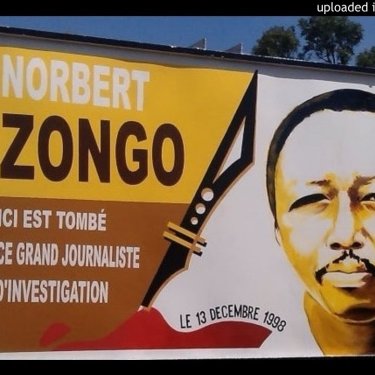Will extradition end 19 years of impunity in journalist's murder?

Reporters Without Borders (RSF) calls on the French judicial system to approve Burkina Faso's request for the extradition of former President Blaise Compaoré's brother, François Compaoré, one of the main suspects in the murder of a journalist whose body was found exactly 19 years ago today.
Suspected of being one of the instigators of journalist Norbert Zongo's 1998 murder, François Compaoré was arrested under an international warrant as he disembarked from a plane in Roissy Charles de Gaulle airport in Paris on 29 October and has been banned from leaving France ever since. Issued in May, the warrant accuses him of "inciting murder."
RSF believes that it is crucial that François Compaoré should stand trial in his country of origin, Burkina Faso, although he now lives in Côte d'Ivoire and has acquired Ivorian nationality. Justice has never been rendered for Zongo's murder.
"We hope the French justice system approves Burkina Faso's extradition request," said Clea Kahn-Sriber, the head of RSF's Africa desk. "Its society was deeply traumatized by this murder and must now heal its wounds. This means a trial in Burkina Faso that strengthens the people's confidence in their own institutions and shows that a journalist's murder cannot go unpunished."
During a visit to Burkina Faso in late November, French President Emmanuel Macron referred to the case and, at the same time, to judicial independence. Macron said François Compaoré's arrest in Paris was "the result of exemplary cooperation between our two judicial systems, which are both independent." He added: "It is up to the French courts to take their decision and I will do everything to facilitate it."
Zongo was an investigative reporter who edited a weekly called the L’Indépendant. His burned and bullet-riddled body was found in his gutted car around 100 km south of Ouagadougou on 13 December 1998. At the time of his death, he had been investigating the death in detention of François Compaoré’s driver, who had been accused of theft.
RSF, which participated in a commission of enquiry in December 1998, repeatedly condemned the political pressure on those investigating the murder, which led to the case beingdismissed in 2006. It was reopened in March 2015, during the political transition that followed Blaise Compaoré’s overthrow after 27 years as president.
Three former presidential guard members were arrested in December 2015, and many indirect witnesses have been questioned since then. But none of these measures have produced any definitive results and Burkina Faso's citizens are still no closer to knowing the identity of those behind Zongo's murder.
When contacted by RSF, Zongo family lawyer Bénéwendé Sankara said: "We expect the French courts to do their job and to help us to bring the big fish to justice. The foot-dragging must stop. Nineteen years is too long to wait for any trial."
The African Court on Human and Peoples' Rights ruled in March 2014 that Burkina Faso’s authorities had “not acted with due diligence” in their investigation into Zongo’s murder. The families of Zongo and those who were murdered with him have now been awarded compensation, but justice has still not been rendered.
Burkina Faso is ranked 42nd out of 180 countries inRSF’s 2017 World Press Freedom Index. Its media are relatively free and covered the 2014 political crisis in a professional manner.



